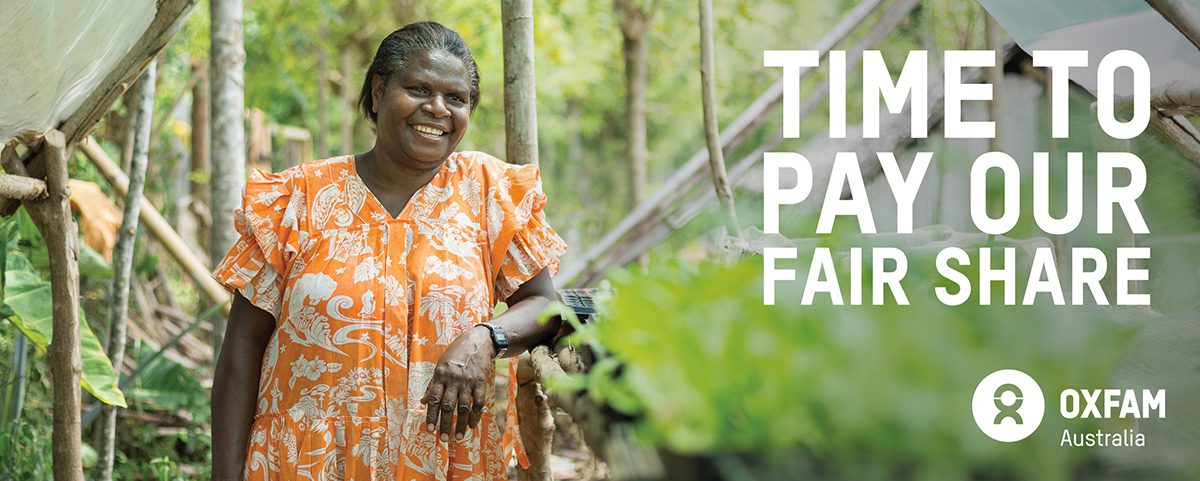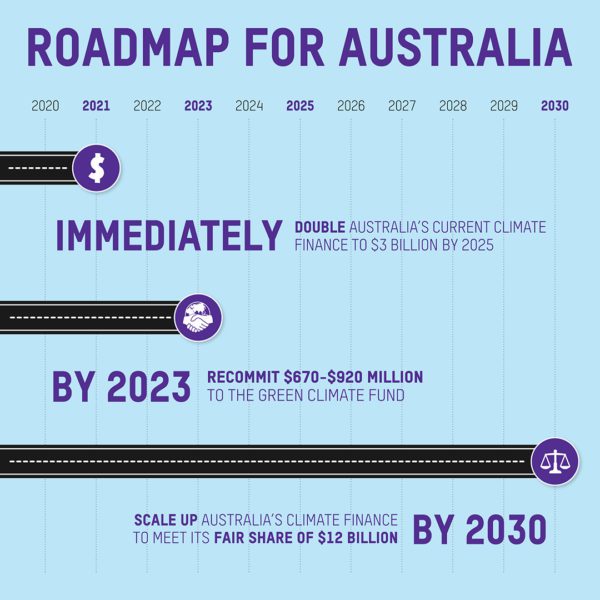
In the past year alone, the world has seen deadly cyclones, huge locust swarms and unprecedented heatwaves and bushfires, all turbo-charged by climate change – it’s clear the climate crisis is here. What’s more, many of the communities that are hardest hit have contributed least to the crisis, like our neighbours in the Pacific region.
Funding required to support low-income countries to mitigate and adapt to climate change, also known as climate finance, as well as funding to compensate for its irreversible consequences, known as loss and damage funding, is more important than ever.
The climate crisis is clearly a human rights issue.
We owe it to all low-income countries – but particularly our Pacific neighbours who are facing the very real threat of rising sea levels compounded by the COVID-19 crisis – to help them deal with the consequences of our rampant consumption and recent inaction.
Climate finance
Oxfam Australia worked with Climate Action Network Australia, ActionAid Australia, Climate Council, The Australia Institute, Edmund Rice Centre and Greenpeace to produce a new report
Fairer Futures: Financing Global Climate Solutions
This report outlines a roadmap for Australia to progressively increase its climate finance by ending fossil fuel subsidies to ensure we are contributing our fair share of finance by 2030. This will help ease the burden on the world’s poorest communities, which are now facing climate-fueled disasters on top of the COVID-19 crisis.
In October, the Pacific Islands Climate Action Network, which is made up of civil society groups from across the Pacific called for an immediate end to fossil fuel projects and subsidies. To understand the enormity of the Australian government’s funding of fossil fuels consider this, in the last financial year, the Australian Government allocated $9.1 billion in federal subsidies to fossil fuel industries. In contrast, the 2021-22 aid budget, including additional COVID-19 measures, totalled just $4.3 billion.
Our analysis found Australia should:
- Immediately commit to increasing its finance to $3 billion over the next five years
- By 2023, shape regional and global climate responses by replenishing the Green Climate Fund (GCF) with up to $990 million
- By 2030, scale up Australia’s climate finance to $12 billion annually, which will meet its fair share.

A roadmap for climate finance
Scott Morrison has announced an increase of only $2 billion to 2025. While this is welcome, it is effectively only a boost of $500 million. Unfortunately, the Government has indicated it won’t make contributions to the GCF or end fossil fuel subsidies. There is still an opportunity for us to up our ambition from what has already been committed until 2025.
Loss and damage
It’s important to acknowledge these contributions don’t take into account the massive damage that is already being caused by climate change. Even with today’s current warming of 1.1° low-income countries are footing the bill – through the loss of lands, livelihoods and culture. This is why Oxfam Australia and Oxfam Aotearoa developed the report: Breaking Through Red Lines: Ways Foward for Loss and Damage in the Pacific. The report provides recommendations to our governments to address the unavoidable loss and damage communities across the Pacific are experiencing, and opportunities to advance solutions globally.
As articulated by Sarah Kaplan in the Washington Post, loss and damage funding is at a global impasse with commitments, first made at the COP19 in Warsaw, still lacking resourcing. Breaking Through Red Lines considers Australia’s place in the world and our region and asks the Government to:
- Align with the negotiating positions of Small Island Developing States within the Pacific on loss and damage
- Support the operationalisation of an effective Santiago Network on Loss and Damage, meeting its mandate to provide action and support for vulnerable developing countries.
- Support making loss and damage a standing item for future COPs.
- Support the development of a financial arm of the Warsaw International Mechanism, to align with the WIM’s existing mandate, with potential to build on the Executive Committee and Santiago Network.
- Alongside the COP process, advocate for a new loss and damage solidarity fund with a ‘coalition of the willing’ of donor countries based on the principles of solidarity and common but differentiated responsibilities.
- Support the establishment of a process at COP26 to develop new sources of international finance for loss and damage, which could include a climate damages tax on carbon majors, wealth tax, shifting fossil fuel subsidies and as a minimum, cancelling debt during climate-induced crises.
More than emissions reductions
While emission reduction targets and commitments to achieve net zero emissions are important, there is far more Australia could be doing now to allow tangible support to reach those who need it most.
Ambitious international climate finance and a commitment to ending fossil fuel funding is not only a good thing to do from a human rights perspective, it facilitates international cooperation to reduce emissions. At this COP we have seen India, the world’s third-biggest emitter, commit to net-zero by 2070 in what some commentators have classed a ‘bold’ move. India’s Prime Minister, Narendra Modi, drew a clear link between the level of global climate finance available to India and their ability to rapidly transition to renewable energy.
While Australia currently sits near the bottom of global rankings for climate finance and broader climate action, in 2009 the nation took a leadership role by helping to establish the Green Climate Fund. The Morrison Government then abandoned the fund amid scathing criticism by Pacific leaders. Australia has missed some crucial moments for leadership at COP26 in our level of ambition for climate finance, emissions reductions and real support for our friends in the Pacific on loss and damage. We need to see our leaders up this ambition in this critical decade – There’s no time to waste.
Image: Leitamat at her home in Vanuatu. Credit: Artur Francisco/Oxfam NZ
